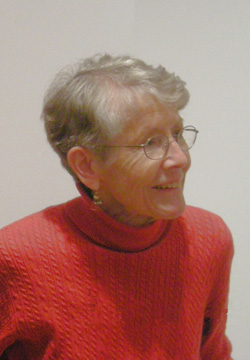Background on Nancy Foster

Nancy E. Foster
A committed advocate for peace and social justice, Nancy Foster spent decades working through, and sometimes against, the political system to effect positive social change. Born in Duluth, Minn., on Dec. 24, 1928, Nancy Elizabeth (Abbott) Foster was raised in the small town of Warwick, New York. The middle of three daughters born to Frank and Lorena Abbott, her political views were shaped by the hardships of the Great Depression, Pearl Harbor, and the Second World War, and by her father's faith that it was possible for government to help ordinary people.
A superior student, Nancy was keenly attuned to current events from an early age, writing her senior thesis in high school on the atomic bomb and delivering a valedictory address in 1946 where she called for keeping atomic energy under the control of the Nuclear Regulatory Agency. One year after graduating from Swarthmore with a degree in economics and political science (1950), Nancy married her college classmate, John Foster, and moved to Cambridge, Mass. While John pursued graduate study in biochemistry at Harvard, followed by a postdoctoral position at MIT, Nancy was employed in local social agencies, studied in the School of Social Work at Boston University, and gave birth to the first of the couple's two children. When their lives were uprooted after John was ordered to Japan to fulfill his military service, Nancy remained busy. While overseas, she carried out the research for her master's degree in social work, collecting material on marriages between U.S. servicemen and Japanese women, and she gave birth to the couple's second child.
The Fosters returned to Massachusetts in 1958, settling in Needham. It was there that Nancy's activism quickened. Energized by local protests against housing discrimination, Nancy volunteered for the Needham Fair Housing Committee, just the second such organization in the Commonwealth, and she was appointed secretary after attending only her first meeting. Just as significantly for the future course of the Fosters' activism, Nancy and John found themselves deeply impressed by the commitment to social justice exemplified by the Unitarian minister at the First Parish in Needham, sparking what would become a lifelong religious affiliation.
From Needham, John went on to work for two and half years with the National Science Foundation in Washington, D.C., and characteristically, Nancy became active in the local community. Working as a counselor in a clinic for pregnant teenagers, Nancy was witness to some of the early civil rights riots in the city and during Martin Luther King's March on Washington, she worked a tent on the Mall dispensing "soul help." By the time the Fosters returned to Massachusetts in 1969, settling in Amherst, Nancy's involvements seemed only to increase. As a member of the League of Women Voters, she helped to organize a study of the executive branch of town government, leading her in turn into a stint on Town Meeting that eventually extended fourteen years. When the nuclear freeze movement took hold in the Pioneer Valley in the early 1980s, she took up the challenge of organizing against nuclear escalation; in particular, leading local resistance to Reagan-era plans for the mass relocation of urban residents to small towns in the event of nuclear war. Her efforts to raise the issues before the Amherst Select Board and local citizenry resulted in the Board voting against town participation in the project, and her methods for raising awareness served as a model for other towns across the country.
Her highest profile work during this period centered on opposition to the Ground Wave Emergency Network (GWEN), which was intended to serve as a military communications system in the aftermath of a nuclear war. When Nancy learned that the Air Force was planning to build a GWEN communications tower in Amherst in 1985, she invited the colonel in charge of the program to address the town and explain the reasons for the project. Despite the skepticism of the Select Board, Nancy raised the issue in Town Meeting and publicly presented the counterpoint to the colonel's presentation. Working closely with her colleague Lois Barber, and with the support of local Republican representative Silvio Conte, Nancy saw opposition to the GWEN system spread widely in New England and the mid-Atlantic states, eventually leading Congress to force the Air Force to suspend the program until a thorough study of the impact of electromagnetic radiation on the public was completed.
In later years, Nancy continued to press for social justice locally and regionally, working closely with the Bill of Rights Defense Committee and the American Civil Liberties Union, and with local activist organizations such as SAGE and the Social Justice Committee of the Unitarian Universalist Society of Amherst. Her antiwar work accompanied work on a host of related issues ranging from hunger and economic inequality to opposing the Patriot Act and the erosion of civil liberties in the years following the September 11 terrorist attack on the World Trade Center. A regular presence at the Amherst July 4th parades, she was noted for carrying placards promoting civil liberties, earning a senior activist award from the Amherst Human Rights Commission. In addition to her social and political activism, Nancy was a beloved family member and the center of a large circle of friends. She died in Amherst on June 24, 2010, and was survived by her John and children.

